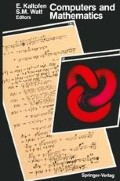Abstract
Many important algorithms in computations with permutation groups require an efficient solution to the group membership problem. This requires deciding if a given permutation is an element of a permutation group G specified by a set of generators. Sims [8] developed an elegant solution to this problem. His method relies on the construction of an alternative generating set for G known as a strong generating set which can be easily used to test membership of an arbitrary permutation in G. This algorithm was shown to have worst case time O(n 6). Later versions [1, 5, 6] have improved the theoretical worst case time but without necessarily improving the performance in practice. An algorithm is presented here which has an observed running time of O(n 4) for all permutations groups for which it has been tested. (The worst-case time for this algorithm is O(n 5).) The key idea is a new test [3] for whether a set of generators is a strong generating set. Each call to this last test has worst case time O(n 4). A further reduction in time is achieved by using a fast algorithm for finding reduced generating sets. For groups with small bases, the running running time is O(n 2), which is optimal for the data structure used.
The work of this author was supported in part by the National Science Foundation under grant number DCR-8603293.
Access this chapter
Tax calculation will be finalised at checkout
Purchases are for personal use only
Preview
Unable to display preview. Download preview PDF.
References
L. Babai, E. Luks, and A. Seress, “On Managing Permutation Groups in O(n4logc7n)”,Proc. 28th IEEE FOCS (1988), 272–282.
C. A. Brown, G. Cooperman, and L. Finkelstein, “Solving Permutation Problems Using Rewriting Rules”, to appear inProc. of the International Symposium on Symbolic and Algebraic Computation (ISSAC 88, Rome, Italy), Springer Verlag Lecture Notes in Computer Science.
G. Cooperman and L.A. Finkelstein, “Short Presentations for Permutation Groups and a Strong Generating Test”, submitted to J. Symbolic Computation.
M. Hall, Jr.,The Theory of Groups ,Macmillan, New York, 1959.
M. Jerrum, “A Compact Representation for Permutation Groups”, J.Algorithms 7 (1986), 60–78.
D.E. Knuth, “Notes on Efficient Representation of Permutation Groups” (1981), unpublished manuscript.
J. Leon, “On an Algorithm for Finding a Base and Strong Generating Set for a Group Given by a Set of Generating Permutations”,Math. Comp. 35 (1980), 941–974.
C.C. Sims, “Computation with Permutation Groups”, inProc. Second Symposium on Symbolic and Algebraic Manipulation, edited by S.R. Petrick, ACM, New York, 1971.
Author information
Authors and Affiliations
Editor information
Editors and Affiliations
Rights and permissions
Copyright information
© 1989 Springer-Verlag New York Inc.
About this paper
Cite this paper
Cooperman, G., Finkelstein, L., Purdom, P.W. (1989). Fast Group Membership Using a Strong Generating Test for Permutation Groups. In: Kaltofen, E., Watt, S.M. (eds) Computers and Mathematics. Springer, New York, NY. https://doi.org/10.1007/978-1-4613-9647-5_4
Download citation
DOI: https://doi.org/10.1007/978-1-4613-9647-5_4
Publisher Name: Springer, New York, NY
Print ISBN: 978-0-387-97019-6
Online ISBN: 978-1-4613-9647-5
eBook Packages: Springer Book Archive

